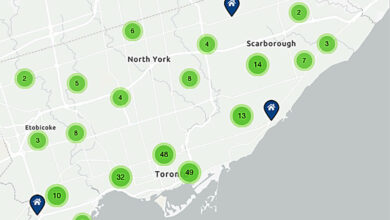The Canadian Dream or Nightmare? It depends on Your Age

The Canadian Dream: How do you define it? It depends on who you ask, but in general, it will probably include: a good job, a house, educated children, health care, and a reliable government pension system.
Is the Canadian Dream alive and well? It depends on how old you are and where you live. While boomer vs millennial debates is in many ways no different than the conflicts faced by previous generations, this time around, things are looking rather one-sided.
Boomers have had quite the ride and faced their share of challenges along the way. Hyperinflation, double-digit mortgage rates, and multiple stock market corrections, but the result is a population that holds a disproportionate percentage of all Canadian wealth compared to all other generations.
The most striking sign of this is that boomers have benefited from a 400% inflation-adjusted increase in the price of housing since 1975. And while boomer homeowners are happy with that result, it’s far from normal. Toronto boasts several of the most top 20 overpriced housing markets in the world. Even Hamilton has now made the list. By contrast, the US housing market has increased by only 200% over that period and at current levels is resulting with many people calling for efforts to cool it off.
Millennials, on the other hand, are coming of age in an era where inflation-adjusted wages have increased only 200% since 1975, which despite the ultra-low interest rate environment, makes those same houses boomers are calling their best investment completely out of reach.
But that’s not their only challenge. Student debt levels are on the rise, due in part to a lack of growth in government funding due to decreasing tax rates over the boomer’s lifetimes. Couple that with the fact that they are competing in one of the most educated markets in the world, the return on investment they can expect for their education spending is less than in other countries. And even when they get a job to pay that debt that doesn’t pay them enough to save for a home, they get to pay 12% of their income to support the Canada Pension Plan and the deficit it faces due to underfunding by Boomers who were paying a total of 2% when they started paying into it in the late 70s.
And when millennials point this out or talk about how difficult their situation is, what are they greeted with? Accusations of being lazy and entitled.
This is not unusual either. Every generation thinks the next generation is devoid of the work ethic theirs had. Even Socrates famously wrote about the problems with “kids these days” back in ancient Greece. This time around, however, the data support the millennials over the boomers.
So what’s the result: The boomers had their dream, for now, but if the millennials give up on it, then their nightmare can become the boomer’s nightmare. The post covid world will inevitably result in higher taxation to an already higher-taxed populace. This will also put pressure on funding all the programs that boomers will need more of in old age.
So what’s to keep a millennial in Canada? Besides affection for home and proximity to family? Why stay to make less, pay more in tax, all so that you can not afford the same lifestyle your parents had? And we are already seeing the implications of this come to roots. Interprovincial migration has hit a new high with over 20,000 people leaving Ontario in the past year for other provinces like Alberta, where taxes are lower and housing is not out of reach. But what happens when that sale is over? The expatriation of young highly-skilled, well-paid workers is likely to become a bigger issue in the coming years which will only result in a weaker economy, lower tax proceeds, and eventually softer housing prices.
That is the very real challenge facing many in their 20s and early 30s. For most, the only hope is for their parents to help them finance a down payment by borrowing money from their highly inflated family home. This too, has hit levels unthought of with the average parental gift to help first-time buyers obtain a new home hit $180,000 in the past year. Without that, what hope do they have?
There is a world for a society that requires intergenerational wealth transfers in order to ensure the success of the next generation. It’s called feudalism, and it hasn’t worked in over 100 years, and it isn’t going to work in the modern world where highly educated people can more easily leave than stay and put up with a nation that has favoured their parent’s generation over their own. Ironically the Portuguese diaspora may have moved to Canada for a better life only to see their children and grandchildren move back to Portugal and the booming Lisbon technology scene for a better life.
Manuel Luis








Redes Sociais - Comentários